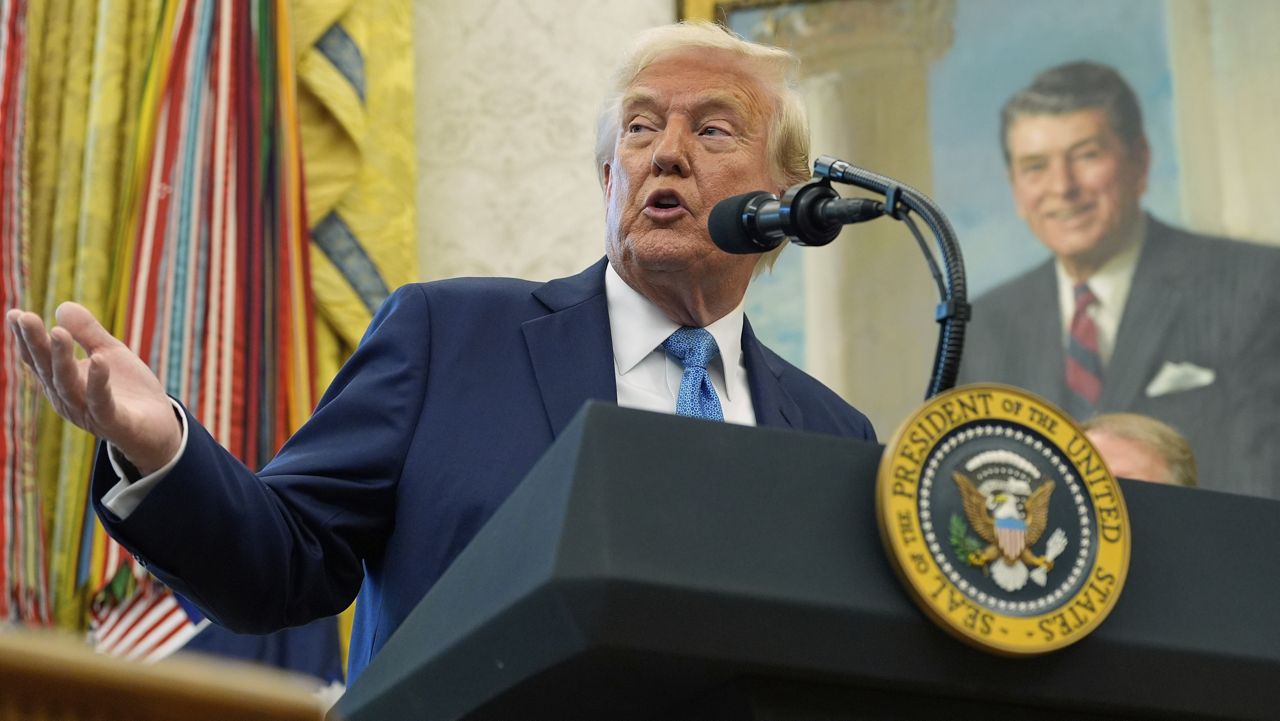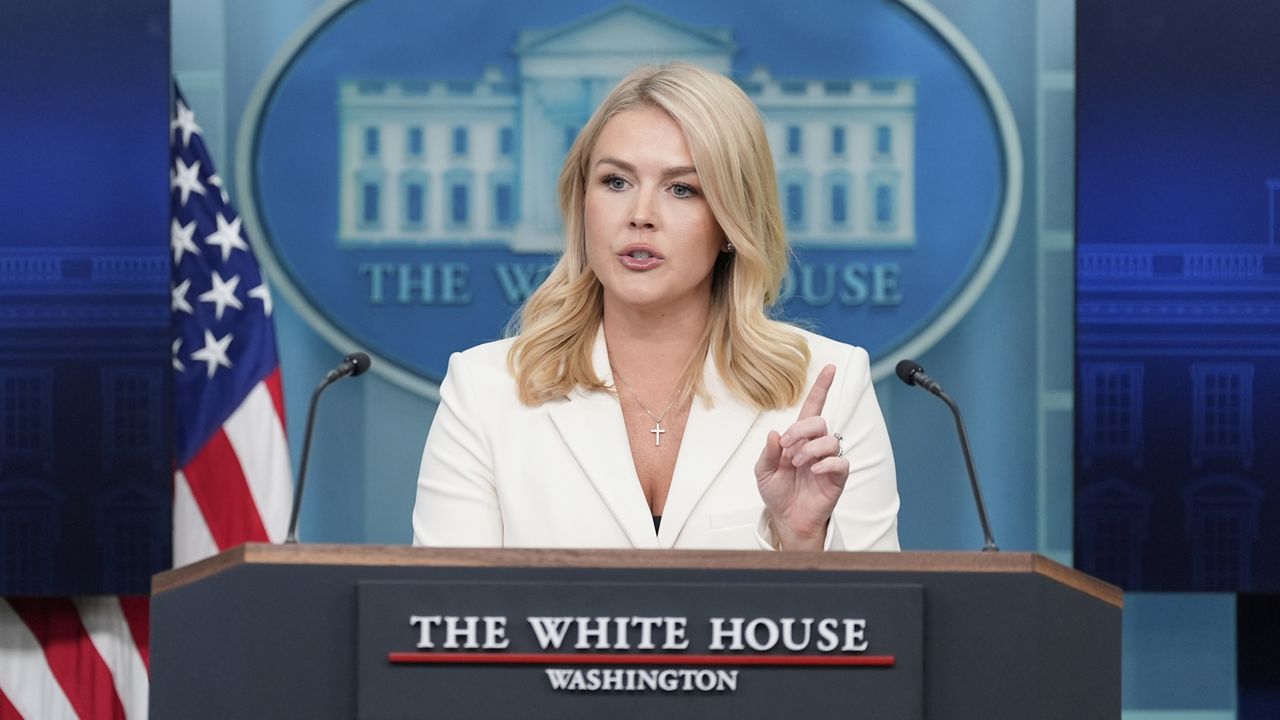WASHINGTON — President Donald Trump on Thursday acknowledged the U.S. could face “transition problems” while projecting confidence in his long-term plan one day after announcing a major shift to his highly anticipated tariff strategy laid out last week.
“We think we’re in very good shape, we think we’re doing very well,” Trump said at a meeting with his Cabinet at the White House. “Again, there will be a transition cost and transition problems but in the end, it’s going to be a beautiful thing.”
Trump on Thursday huddled with his department heads and highest-level administration officials less than 24 hours after announcing he was issuing a 90-day pause on the “reciprocal” tariffs he placed on dozens of countries with large trade deficits with the U.S.. A 10% across-the-board tariff is set to stay in place. China was the exception to the pause with Trump placing a 145% tariff in total on imports into the U.S. from the country.
Trump’s assessment came as U.S. stocks fell again on Thursday morning after a brief surge following the president’s announcement of the delay the day before.
The president told reporters that he hadn’t seen the numbers as he was in the meeting and turned to Treasury Secretary Scott Bessent, who expressed optimism about the markets. Earlier in the meeting Bessent noted Wall Street has “done great” for years.
“It’s Main Street’s turn now,” he said.
The secretary added that things will settle as the administration negotiates and works out new trade deals with countries during the pause.
“As we go through the queue and settle with these countries who are going to bring us their best offers, we will end up in a place of great certainty over the next 90 days on tariffs,” he said.
Earlier in the day, National Economic Council Director Kevin Hassett told reporters that 15 countries thus far have made “explicit” offers.
Administration officials have been presenting the pause as part of the president’s long-pledged tariff plan all along as part of his bid to negotiate better trade policies with countries. But Trump on Wednesday said that the delay “came together” that morning and acknowledged that he was watching the bond market and noticed people “getting a little queasy."
Asked by reporters at the Cabinet meeting if the tariff rates would return to the higher levels originally announced if new trade agreements are not reached within the 90-day timeframe, Trump said “that’s what would happen.”
At the same time, he did not rule out the possibility of extending the pause and stressed that any trade deals have to to be “good for both parties.”
The president also said he is not currently considering any exceptions for particular companies but said “it could happen.”
“It’s called flexibility, you have to have certain flexibility,” he said.
As for China, Trump reiterated his belief that a deal to lower the now sky-high tariffs would be reached in the end.
“I have great respect for President Xi,” Trump said. “He’s been, in a true sense, he’s been a friend of mine for a long period of time, and I think that we’ll end up working out something that’s very good for both countries.”
The president dismissed China’s move on Thursday to restrict American films released in the country amid the escalating trade battle, saying “I’ve heard of worse things.”
Bessent also praised new consumer price inflation numbers for March released on Thursday, calling the report “quite good.”
Meanwhile the president during Thursday’s meeting had each secretary provide an update on work their department is embarking on.
After Homeland Security Secretary Kristi Noem spoke about “self-deportation,” Trump jumped in to say that the administration will “work with” farmers to allow some space in his immigration agenda for a gentler approach and one where they could potentially return legally.
“We're also going to work with farmers that if they have strong recommendations from their farms, for certain people, we're going to let them stay in for a while and work with the farmers and then come back and go through a process, a legal process,” Trump said.
He went on to say that those in the hotel industry could be included in the more lenient approach as well.
“We have to take care of our farmers and hotels and, you know, various, various places where they're usually, where they need the people,” he said.
Commerce Secretary Howard Lutnick also said the president’s previously-announced $5 million “gold card” visa that could offer a path to citizenship would be available within a week and a half.
Meanwhile, Trump celebrated House passage earlier in the day of the Senate resolution that serves as a blueprint to ultimately passing the president’s agenda on the border, defense, energy and taxes. Although not low yet, Bessent noted it includes an increase in the debt limit, proclaiming that the issue will be “done and dusted” they won’t have to worry about it.
Billionaire and advisor to the president Elon Musk, who is leading Trump’s wide-scale government downsizing effort through the U.S. Doge Service, was also at the meeting. He touted the officials that make up Trump’s Cabinet, which comes after reports he has clashed with some behind closed doors and a public feud with the president’s trade advisor Peter Navarro this week.
Separately, Attorney General Pam Bondi said the Justice Department has made four arrests in connection to attacks on Musk’s company Tesla. She noted those accused of attacking or vandalizing cars and showrooms are facing 20 years in prison and noted that there will be no negotiations.
“There will be no negotiations at your directive,” she said to the president.
Health and Human Services Secretary Robert F. Kennedy Jr., meanwhile, used the meeting to announce a “massive testing and research effort” to find the cause of autism, which he claimed would be done by September.








